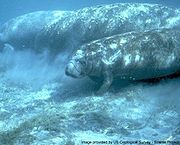
List of mammals in Montserrat
Encyclopedia
This is a list of the mammal species recorded in Montserrat. There are 9 mammal species in Montserrat
, of which 0 are critically endangered, 1 is endangered, 1 is vulnerable, and 0 are near-threatened.
The following tags are used to highlight each species' conservation status as assessed by the IUCN
:
Some species were assessed using an earlier set of criteria. Species assessed using this system have the following instead of Near Threatened and Least Concern categories:
Order: Sirenia
----
 Sirenia is an order of fully aquatic, herbivorous mammals that inhabit rivers, estuaries, coastal marine waters, swamps, and marine wetlands. All four species are endangered.
Sirenia is an order of fully aquatic, herbivorous mammals that inhabit rivers, estuaries, coastal marine waters, swamps, and marine wetlands. All four species are endangered.
The bats' most distinguishing feature is that their forelimbs are developed as wings, making them the only mammals in the world naturally capable of flight. Bat species account for about 20% of all mammals.
Montserrat
Montserrat is a British overseas territory located in the Leeward Islands, part of the chain of islands called the Lesser Antilles in the West Indies. This island measures approximately long and wide, giving of coastline...
, of which 0 are critically endangered, 1 is endangered, 1 is vulnerable, and 0 are near-threatened.
The following tags are used to highlight each species' conservation status as assessed by the IUCN
World Conservation Union
The International Union for Conservation of Nature and Natural Resources is an international organization dedicated to finding "pragmatic solutions to our most pressing environment and development challenges." The organization publishes the IUCN Red List, compiling information from a network of...
:
| EX | Extinct | No reasonable doubt that the last individual has died. |
| EW | Extinct in the wild | Known only to survive in captivity or as a naturalized populations well outside its previous range. |
| CR | Critically Endangered | The species is in imminent risk of extinction in the wild. |
| EN | Endangered | The species is facing an extremely high risk of extinction in the wild. |
| VU | Vulnerable | The species is facing a high risk of extinction in the wild. |
| NT | Near Threatened | The species does not meet any of the criteria that would categorise it as risking extinction but it is likely to do so in the future. |
| LC | Least Concern | There are no current identifiable risks to the species. |
| DD | Data Deficient | There is inadequate information to make an assessment of the risks to this species. |
Some species were assessed using an earlier set of criteria. Species assessed using this system have the following instead of Near Threatened and Least Concern categories:
| LR/cd | Lower Risk/conservation dependent | Species which were the focus of conservation programmes and may have moved into a higher risk category if that programme was discontinued. |
| LR/nt | Lower Risk/near threatened | Species which are close to being classified as Vulnerable but are not the subject of conservation programmes. |
| LR/lc | Lower Risk/least concern | Species for which there are no identifiable risks. |
Order: SireniaSireniaSirenia is an order of fully aquatic, herbivorous mammals that inhabit swamps, rivers, estuaries, marine wetlands, and coastal marine waters. Four species are living, in two families and genera. These are the dugong and manatees...
(manatees and dugongs)
----
- Family: Trichechidae
-
- Genus: Trichechus
- West Indian ManateeWest Indian ManateeThe West Indian Manatee is a manatee, and the largest surviving member of the aquatic mammal order Sirenia . The West Indian Manatee, Trichechus manatus, is a species distinct from the Amazonian Manatee, T. inunguis, and the West African Manatee, T. senegalensis...
Trichechus manatus VU
- West Indian Manatee
- Genus: Trichechus
-
Order: Chiroptera (bats)
----The bats' most distinguishing feature is that their forelimbs are developed as wings, making them the only mammals in the world naturally capable of flight. Bat species account for about 20% of all mammals.
- Family: Noctilionidae
-
- Genus: Noctilio
- Greater Bulldog BatGreater Bulldog BatThe greater bulldog bat or fisherman bat is a type of fishing bat native to Latin America. The bat uses echolocation to detect water ripples made by the fish upon which it preys, then uses the pouch between its legs to scoop the fish up and its sharp claws to catch and cling to it...
Noctilio leporinus LR/lc
- Greater Bulldog Bat
- Genus: Noctilio
-
- Family: Molossidae
-
- Genus: TadaridaTadaridaThe genus Tadarida has ten or more species of bats divided into two subgenera, with the first of these containing seven species spread across the Old World...
- Mexican Free-tailed BatMexican Free-tailed BatThe Mexican free-tailed bat , also known as the Brazilian free-tailed bat, is a medium-sized bat that is native to the Americas and is widely regarded as one of the most abundant mammals in North America...
Tadarida brasiliensis LR/nt
- Mexican Free-tailed Bat
- Genus: Tadarida
-
- Family: Phyllostomidae
- Subfamily: Brachyphyllinae
- Genus: BrachyphyllaBrachyphyllaBrachyphylla is a genus of bat in the family Phyllostomidae.It contains the following species:* Cuban Fruit-eating Bat * Antillean Fruit-eating Bat...
- Antillean Fruit-eating BatAntillean Fruit-eating BatThe Antillean Fruit-eating Bat is one of two leaf-nosed bat species belonging to the Brachyphylla genus. The species occurs in the Caribbean from Puerto Rico to St. Vincent and Barbados. Fossil specimens have also been recorded from New Providence, Bahamas.-Taxonomy:Three subspecies of...
Brachyphylla cavernarum LR/lc
- Antillean Fruit-eating Bat
- Genus: Brachyphylla
- Subfamily: GlossophaginaeGlossophaginaeGlossophaginae is a subfamily of leaf-nosed bats.-List of species:Subfamily: Glossophaginae* Tribe Glossophagini**Genus: Anoura - Geoffroy's Long-nosed Bats***Anoura aequatoris***Cadena's Tailless Bat, Anoura cadenai...
- Genus: MonophyllusMonophyllusMonophyllus is a genus of bat in the family Phyllostomidae.It contains the following species:* Insular Single Leaf Bat * Leach's Single Leaf Bat...
- Insular Single Leaf BatInsular Single Leaf BatThe Insular Single Leaf Bat is a species of bat in the family Phyllostomidae. It is found in Anguilla, Antigua and Barbuda, Barbados, Dominica, Guadeloupe, Martinique, Montserrat, Saint Lucia, and Saint Vincent and the Grenadines.-Source:* Chiroptera Specialist Group 1996. . Downloaded on 30...
Monophyllus plethodon LR/nt
- Insular Single Leaf Bat
- Genus: Monophyllus
- Subfamily: StenodermatinaeStenodermatinaeStenodermatinae is a large subfamily of bats in the family Phyllostomidae.-List of species:Subfamily Stenodermatinae*Genus: Ametrida**Little White-shouldered Bat, Ametrida centurio*Genus: Ardops**Tree Bat, Ardops nichollsi...
- Genus: Ardops
- Tree BatTree BatThe Tree Bat is a species of bat in the family Phyllostomidae. It is monotypic within the genus Ardops. It is found in Dominica, Guadeloupe, Martinique, Montserrat, Netherlands Antilles, Saint Lucia, Saba and Saint Vincent and the Grenadines.-Source:* Chiroptera Specialist Group 1996. . ...
Ardops nichollsi LR/nt
- Tree Bat
- Genus: ArtibeusArtibeusThe Neotropical fruit bats are a genus of bats within the subfamily Stenodermatinae. The genus consists of 21 species, which are native to Central and South America, as well as parts of the Caribbean.-Description:...
- Jamaican fruit batJamaican fruit batThe Jamaican, Common or Mexican fruit bat is a fruit bat native to Central and South America, as well as the Greater and many of the Lesser Antilles. It is also an uncommon resident of the Southern Bahamas...
Artibeus jamaicensis LR/lc
- Jamaican fruit bat
- Genus: ChirodermaChirodermaChiroderma is a genus of leaf-nosed bat found in Central America, South America and the Lesser Antilles.-Species:Genus Chiroderma - Big-eyed Bats or White-lined Bats*Brazilian Big-eyed Bat, Chiroderma doriae...
- Guadeloupe Big-eyed BatGuadeloupe Big-eyed BatThe Guadeloupe Big-eyed Bat is a species of bat in the family Phyllostomidae. It is found in Guadeloupe and Montserrat. It is threatened by habitat loss mostly because of Hurricane Hugo, which destroyed 90% of the population of this bat in 1989. The species may be locally extinct in some areas of...
Chiroderma improvisum EN
- Guadeloupe Big-eyed Bat
- Genus: Ardops
- Subfamily: Brachyphyllinae
- Family: NatalidaeNatalidaeThe family Natalidae, or funnel-eared bats are found from Mexico to Brazil and the Caribbean islands. The family has three genera, Chilonatalus, Natalus and Nyctiellus. They are slender bats with unusually long tails and, as their name suggests, funnel-shaped ears. They are small, at only 3.5 to...
- Genus: NatalusNatalusThe genus Natalus of funnel-eared bats is found from Mexico to Brazil and the Caribbean islands. They are slender bats with unusually long tails and, as their name suggests, funnel-shaped ears. They are small, at only 3.5 to 5.5 cm in length, with brown, grey, or reddish fur...
- Mexican Funnel-eared BatMexican Funnel-eared BatThe Mexican Funnel-eared Bat, Natalus stramineus, is a bat species from the northern Lesser Antilles. The related species N. espiritosantensis is present in Brazil.-References:...
Natalus stramineus LR/lc
- Mexican Funnel-eared Bat
- Genus: Natalus
See also
- List of chordate orders
- List of regional mammals lists
- List of prehistoric mammals
- Mammal classificationMammal classificationMammalia is a class of animal within the Phylum Chordata. Mammal classification has been through several iterations since Carolus Linnaeus initially defined the class. Many earlier ideas have been completely abandoned by modern taxonomists, among these are the idea that bats are related to birds...
- New mammal species

